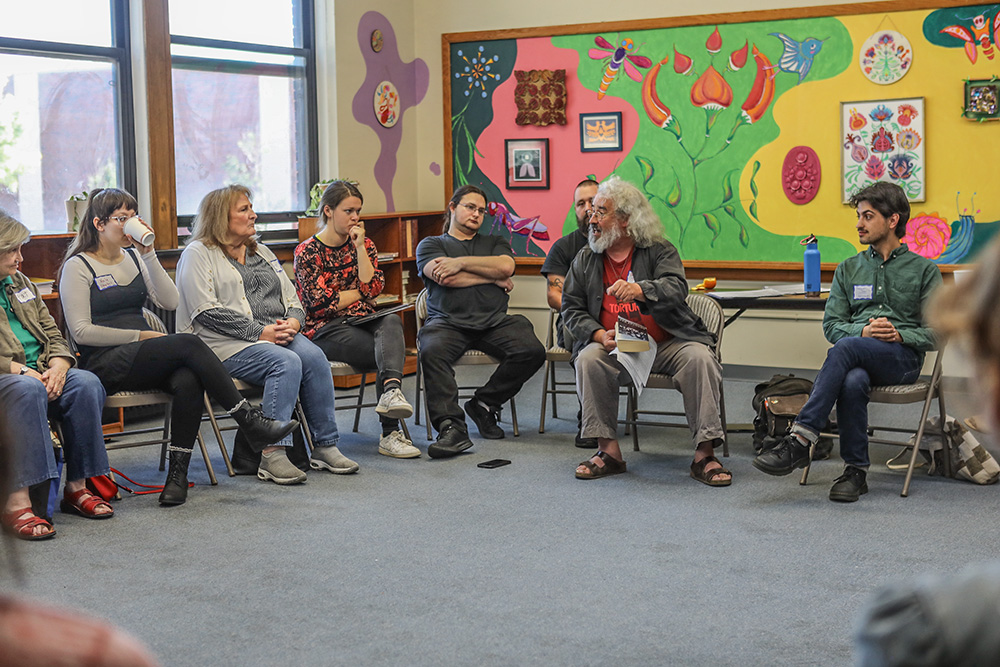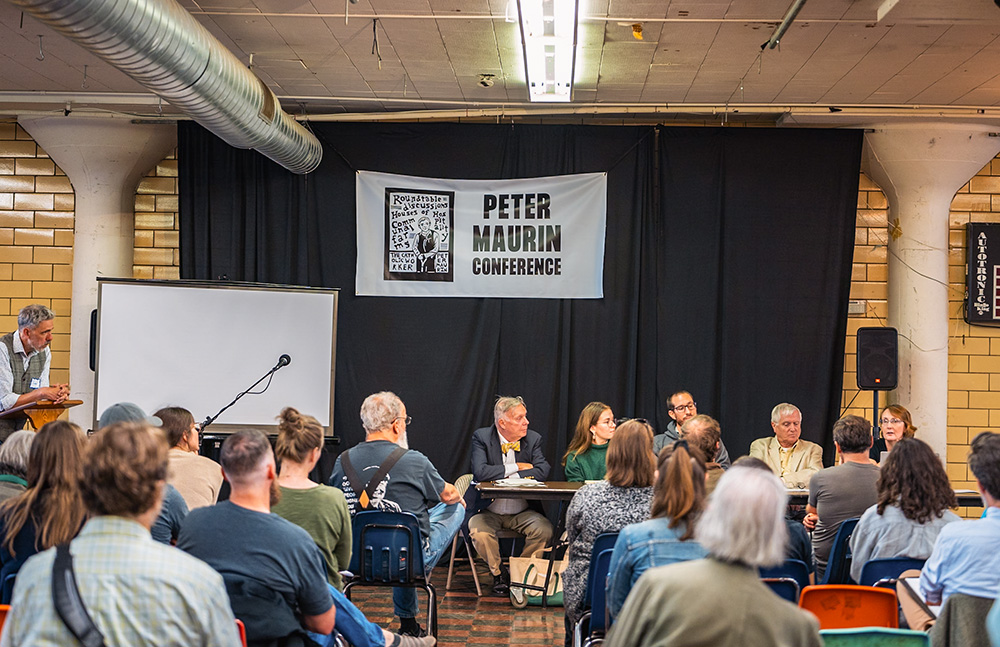
Jeromiah Taylor, right, and Brian Terrell, second from right, co-facilitate a roundtable discussion at the Peter Maurin Conference, which was held at St. Gregory's Hall in Chicago Sept. 6-8. (Mark Franzen)
In perhaps the most famous of his Easy Essays, "Blowing the Dynamite," Catholic Worker co-founder Peter Maurin urged Catholics to recover the radical import of our faith and unleash it upon the world to create a place where it is "easier to be good." Fittingly, the first-ever conference dedicated to Maurin's life centered on the question of how his program can inspire us to "blow the dynamite" of the Gospel.
In the basement of St. Gregory's Hall in Chicago's Edgewater neighborhood Sept. 6-8, the Peter Maurin Conference was hosted by Mary Mother of God Parish and co-sponsored by the Hank Center for the Catholic Intellectual Heritage, Loyola University Chicago and DePaul University. The proceedings included two keynote addresses, an open mic, liturgical gatherings and Sunday Mass.
As required of any Catholic Worker-adjacent event, there was also a large pot of soup. Most notably, the conference eschewed academic conventions by replacing paper presentations with roundtables — a style of engagement integral to Maurin's "Green Revolution" and aligned with the model of synodality.
Gen Z Catholics are hardly apolitical, but do feel tactically underequipped and are hungry for a new repertoire of resistance for the digital age.
During his Friday night keynote, Jon Sozek offered a robust survey of personalism, including an outline of Emmanuel Mounier's complicity with the Vichy regime's fascist co-opt of personalism's "third way." And on Saturday, Lincoln Rice traced the development of Maurin's thought through a collation of his Easy Essays.
But the conference's unique merit lies in its gathering of oft-siloed groups for an engagement with enduring questions. Alluding to this uncommon diversity, Mattie Jenkins, co-founder of the Romero Catholic Worker in Wichita, Kansas, wrote for CatholicWorker.org that attendees "seemed to be linked to one another by [our] anticipation — ragtag bunch though we were — academics and students, veteran Catholic Workers and youngsters like myself."
That anticipation arose from an ongoing renewal of interest in Maurin's ideas. In fact, James Murphy, director of Mary Mother of God's Canterbury House in Chicago and conference co-organizer, said that the conference had been conceived as early as 2019 but postponed due to the advent of COVID-19. Urgency was palpable at the conference, largely due to what Today's American Catholic called the "polycrises" of our time, against which Maurin's social vision takes high relief.
Advertisement
Yet it was an urgency arising from deep solidarity rather than reactionary panic, and was best expressed during the roundtables, where people from various backgrounds — and with varying levels of familiarity with Maurin's legacy — met to discuss broad themes.
During the roundtable that I co-led with Brian Terrell, my eyes were opened to the vibrancy of young America's Catholicism. I'd worried that my topic — the church's missional vocation — was too general and inadequately specific to Maurin. However, our discussion indicated that there were many in attendance who, though attracted to the Worker's charism, were concerned with public arenas far beyond the movement. The aforementioned urgency was unanimous, and most were less concerned with what and far more worried about how.
My main takeaway was that Gen Z Catholics are hardly apolitical, but do, at least in part, feel tactically underequipped and are hungry for a new repertoire of resistance for the digital age.
Following the roundtable, I enjoyed several long conversations with young Catholics, some Chicagoan, and many others who'd traveled to partake in Saturday's proceedings. Among our common concerns was the thin line between proclaiming a social Gospel and aspiring to theocracy. We identified an immediate need to discern the practical differences between resisting and wielding power, and commiserated over the lamentable ways that religion appears in the public square.

In the basement of St. Gregory's Hall in Chicago's Edgewater neighborhood on Sept. 6-8, the Peter Maurin Conference was hosted by Mary Mother of God Parish and co-sponsored by the Hank Center for the Catholic Intellectual Heritage, Loyola University Chicago and DePaul University. (Damian Chlanda)
One young Catholic told me that she was unsure whether she should attach the word Catholic to her social work at all, and others grieved how complex issues are flattened by mainstream discourse. All tensions that arise in Maurin's own legacy, considering his dogmatic, sloganizing advocacy for Catholic social "dominance." Indeed, among our small group there seemed less an appetite for utopia, and more so for a handbook to democracy.
Yet the power of Maurin's name to attract such motley compatriots attests to Jenkins' assessment that out of the conference "one truth emerged above all the rest: We need Peter Maurin." For Maurin still offers antidotes to our most unquestioned social beliefs, and his uncompromising tone urges all to raise our hopes beyond programmatic "progress" and toward radical conversion.
A demanding hope indeed, and one requiring faith not in "privilege or positions of power" but in diá-logos, the Word moving in our midst.
Editor's note: This article was updated to attribute remarks to James Murphy, and to correct spelling of Mark Franzen's name.







